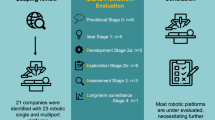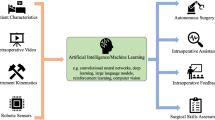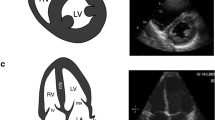Abstract
Background
Simulation-based mastery training may improve clinical performance. The aim of this study was to determine the effect of simulation-based mastery training on clinical performance in abdominal diagnostic ultrasound for radiology residents.
Method
This study was a multicenter randomized controlled trial registered at clinicaltrials.gov (identifier: NCT02921867) and reported using the Consolidated Standards of Reporting Trials (CONSORT) statement. Twenty radiology residents from 10 different hospitals were included in the study. Participants were randomized into two groups: (1) simulator-based training until passing a validated test scored by a blinded reviewer or (2) no intervention prior to standard clinical ultrasound training on patients. All scans performed during the first 6 weeks of clinical ultrasound training were scored. The primary outcome was performance scores assessed using Objective Structured Assessment of Ultrasound Skills (OSAUS). An exponential learning curve was fitted for the OSAUS score for the two groups using non-linear regression with random variation. Confidence intervals were calculated based on the variation between individual learning curves.
Results
After randomization, eleven residents completed the simulation intervention and nine received standard clinical training. The simulation group participants attended two to seven training sessions using between 6 and 17 h of simulation-based training. The performance score for the simulation group was significantly higher for the first 29 scans compared to that for the non-simulation group, such that scores reached approximately the same level after 49 and 77 scans, respectively.
Conclusion
We showed improved performance in diagnostic ultrasound scanning on patients after simulation-based mastery learning for radiology residents.
Trial registration
NCT02921867
Key Points
• Improvement in scanning performance on patients is seen after simulation-based mastery learning in diagnostic abdominal ultrasound.
• Simulation-based mastery learning can prevent patients from bearing the burden of the initial steep part of trainees’ learning curve.


Similar content being viewed by others
Abbreviations
- CONSORT:
-
Consolidated Standards of Reporting Trials
- EFSUMB:
-
European Federation of Societies for Ultrasound in Medicine and Biology
- OSAUS:
-
Objective Structured Assessment of Ultrasound Skills
References
Nicholls D, Sweet L, Hyett J (2014) Psychomotor skills in medical ultrasound imaging: an analysis of the core skill set. J Ultrasound Med 33:1349–1352
Education and Practical Standards Committee, European Federation of Societies for Ultrasound in Medicine and Biology (2006) Minimum training recommendations for the practice of medical ultrasound. Ultraschall Med 27:79–105
(2008) AIUM practice guideline for the performance of an ultrasound examination of the abdomen and/or retroperitoneum. J Ultrasound Med 27:319–326
Barsuk JH, Cohen ER, Feinglass J, McGaghie WC, Wayne DB (2017) Residents’ procedural experience does not ensure competence: a research synthesis. J Grad Med Educ 9:201–208
Reznick RK, MacRae H (2006) Teaching surgical skills--changes in the wind. N Engl J Med 21:2664–2669
Garg M, Drolet BC, Tammaro D, Fischer SA (2014) Resident duty hours: a survey of internal medicine program directors. J Gen Intern Med 10:1349–1354
Cook DA, Brydges R, Zendejas B, Hamstra SJ, Hatala R (2013) Mastery learning for health professionals using technology-enhanced simulation: a systematic review and meta-analysis. Acad Med 88:1178–1186
McGaghie WC (2015) Mastery learning: it is time for medical education to join the 21st century. Acad Med 90:1438–1441
Nayahangan LJ, Nielsen KR, Albrecht-Beste E et al (2018) Determining procedures for simulation-based training in radiology: a nationwide needs assessment. Eur Radiol 28:2319–2327
Østergaard ML, Ewertsen C, Konge L, Albrecht-Beste E, Bachmann Nielsen M (2016) Simulation-based abdominal ultrasound training - a systematic review. Ultraschall Med 37:253–261
Schulz KF, Altman DG, Moher D (2010) CONSORT 2010 statement: updated guidelines for reporting parallel group randomised trials. BMJ 24:340 c332
Todsen T, Jensen ML, Tolsgaard MG et al (2016) Transfer from point-of-care ultrasonography training to diagnostic performance on patients-a randomized controlled trial. Am J Surg 211:40–45
Todsen T, Tolsgaard MG, Olsen BH et al (2015) Reliable and valid assessment of point-of-care ultrasonography. Ann Surg 261:309–315
Konge L, Ringsted C, Bjerrum F et al (2015) The simulation centre at Rigshospitalet, Copenhagen, Denmark. J Surg Educ 72:362–365
Østergaard ML, Nielsen KR, Albrecht-Beste E, Konge L, Nielsen MB (2018) Development of a reliable simulation-based test for diagnostic abdominal ultrasound with a pass/fail standard usable for mastery learning. Eur Radiol 28:51–57
Knol MJ, Pestman WR, Grobbee DE (2011) The (mis)use of overlap of confidence intervals to assess effect modification. Eur J Epidemiol 26:253–254
Bransford JD, Schwartz DL (1999) Chapter 3: Rethinking transfer: a simple proposal with multiple implications. Rev Res Educ 24:61–100
Kirkpatrick D (1950) The Kirkpatrick Model. Available from: https://www.kirkpatrickpartners.com/Our-Philosophy/The-Kirkpatrick-Model. Accessed 13 Oct 2017
Orr KE, Hamilton SC, Clarke R et al (2018) The integration of transabdominal ultrasound simulators into an ultrasound curriculum. Ultrasound 8:1742271X18762251
Larsen CR, Soerensen JL, Grantcharov TP et al (2009) Effect of virtual reality training on laparoscopic surgery: randomised controlled trial. BMJ 338:b1802
Konge L, Clementsen PF, Ringsted C, Minddal V, Larsen KR, Annema JT (2015) Simulator training for endobronchial ultrasound: a randomised controlled trial. Eur Respir J 46:1140–1149
Tolsgaard MG, Ringsted C, Rosthøj S et al (2017) The effects of simulation-based transvaginal ultrasound training on quality and efficiency of care: a multicenter single-blind randomized trial. Ann Surg 265:630–637
Fitts PM, Posner MI (1967) Human performance. Brooks/Cole Publishing Co., Belmont
Magill R, Anderson D (2014) Motor learning and control: concepts and applications, 10th edn. McGraw-Hill Education, Singapore
European Society of Radiology (2013) Organisation and practice of radiological ultrasound in Europe: a survey by the ESR Working Group on Ultrasound. Insights Imaging 29:401–407
Grover SC, Garg A, Scaffidi MA et al (2015) Impact of a simulation training curriculum on technical and nontechnical skills in colonoscopy: a randomized trial. Gastrointest Endosc 82:1072–1079
Cohen J, Cohen SA, Vora KC et al (2006) Multicenter, randomized, controlled trial of virtual-reality simulator training in acquisition of competency in colonoscopy. Gastrointest Endosc 64:361–368
Haycock A, Koch AD, Familiari P et al (2010) Training and transfer of colonoscopy skills: a multinational, randomized, blinded, controlled trial of simulator versus bedside training. Gastrointest Endosc 71:298–307
Strandbygaard J, Bjerrum F, Maagaard M et al (2013) Instructor feedback versus no instructor feedback on performance in a laparoscopic virtual reality simulator: a randomized trial. Ann Surg 257:839–844
Kromann CB, Jensen ML, Ringsted C (2009) The effect of testing on skills learning. Med Educ 43:21–27
Ericsson KA (2015) Acquisition and maintenance of medical expertise: a perspective from the expert-performance approach with deliberate practice. Acad Med 90:1471–1486
Downing SM, Yudkowsky R (2009) Assessment in health professions education. 1. Vol. Routledge, New York
Cook DA, Hatala R (2015) Got power? A systematic review of sample size adequacy in health professions education research. Adv Health Sci Educ Theory Pract 20:73–83
Acknowledgements
The authors would like to thank Kirsten Engel at Copenhagen Academy for Medical Education and Simulation for language revision and all participants and raters for their time.
Funding
The authors state that this work has not received any funding.
Author information
Authors and Affiliations
Corresponding author
Ethics declarations
Guarantor
The scientific guarantor of this publication is Michael Bachmann Nielsen.
Conflict of interest
The authors of this manuscript declare no relationships with any companies whose products or services may be related to the subject matter of the article.
Statistics and biometry
One of the authors has significant statistical expertise.
Informed consent
Written informed consent was obtained from all subjects in this study.
Ethical approval
Institutional Review Board approval was obtained.
Methodology
• prospective
• randomized controlled trial
• multicenter study
Rights and permissions
About this article
Cite this article
Østergaard, M.L., Rue Nielsen, K., Albrecht-Beste, E. et al. Simulator training improves ultrasound scanning performance on patients: a randomized controlled trial. Eur Radiol 29, 3210–3218 (2019). https://doi.org/10.1007/s00330-018-5923-z
Received:
Revised:
Accepted:
Published:
Issue Date:
DOI: https://doi.org/10.1007/s00330-018-5923-z




